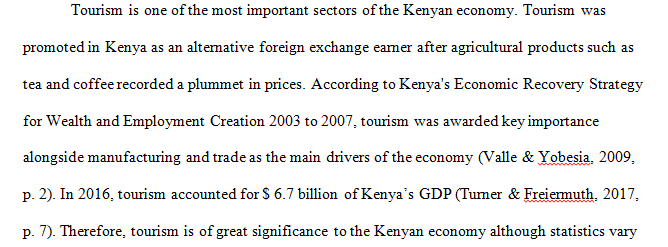Questioning Tourism as Advertised
he topic of the essay is “Questioning Tourism as Advertised.” Choose a holiday destination and search for advertisements promoting this destination in various forms of media (e.g., printed ads, websites, and commercials). Critically analyze these advertisements.
The body of your paper should include the following sections*:
Background
Provide some background information that situates tourism within the country’s economy. You may want to address the following questions: How important is tourism for the economy? How long has tourism been present? Is tourism mostly a rural phenomenon or an urban one?
Description of the Advertisements
Describe the tourist advertisements (both texts and photographs/illustrations). Make sure to include points you are going to question in your analysis of the advertisements. You may want to focus on 2 or 3 advertisements.
Analysis of the Advertisements
This is the most important part of your paper. In this section, you are asked to question the advertisements. Think about what the advertisements emphasize – in regards to, for example, the landscape, cultures, and local people at the destination – and what they leave out that you as a tourism student would like to know. The questions you may want to consider for your analysis are: What do the advertisements promote? What is featured in the photographs or illustrations? Who benefits from tourism? In the case of all-inclusive holidays, do local people benefit in any way? Think of other questions you want to address in your analysis. Use the readings to develop your questions. Although you will probably not be able to answer all the questions, asking them demonstrates that you have read and thought about the issues discussed in this course.
* Please note: The sections do not need to correspond with paragraphs, that is, the body of your paper can consist of more than three paragraphs.
